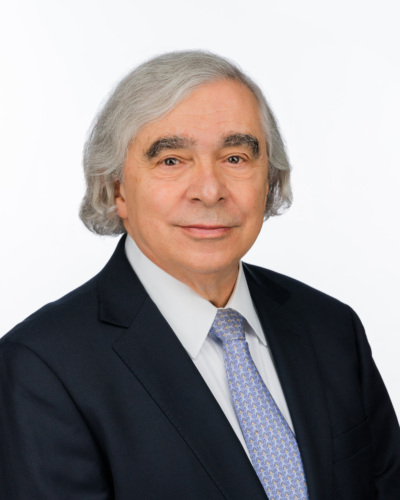This is an excerpt of the full CNN transcript, which appears here. The interview is with John Berman, CNN anchor.
MIKE POMPEO, SECRETARY OF STATE: Denuclearization, only then will there be relief from the sanctions.
(END VIDEO CLIP)
BERMAN: Secretary of State Mike Pompeo saying sanctions on North Korea will not be lifted without complete denuclearization. But North Korea state media is telling its citizens something different, saying it will be a step-by-step process.
Joining us now is Ernest Moniz. He was the U.S. secretary of energy under President Obama, currently the co-chair and CEO of the Nuclear Threat Initiative, a key player in the Iran negotiations.
Mr. Secretary, thank you so much for being with us.
The president, after this summit, said there is no longer a nuclear threat from North Korea. Do you believe that to be the result of this summit in Singapore?
ERNEST MONIZ, FORMER U.S. SECRETARY OF ENERGY UNDER PRESIDENT OBAMA: Well, I think that's very hard to accept given the fact that they still, of course, have their nuclear weapons. And one of the big problems we have is, we don't know how many they have. So once a negotiation starts, clearing understanding their inventory, I might add, not only of nuclear weapons, but of chemical and biological weapons, is going to be a starting place because, frankly, we can start working on that, but we can't trust them in terms of a full declaration.
BERMAN: So when the president says North Korea is no longer a nuclear threat, he's wrong?
MONIZ: Well, yes. I mean nothing has changed on the ground. And I think this idea of personality cults, if you like, has only led to bad results in the past. We can go all the way back to looks into President Putin's eyes, for example, and statements that were regretted later on.
[06:55:19] BERMAN: Well, since you brought that up, let's talk about that, because the president was asked is directly about Kim's human rights record, the executions, the gulags. Let's just listen to this one more time what the president said overnight to Bret Baier.
(BEGIN VIDEO CLIP)
BRET BAIER, FOX NEWS HOST: You know, you call people sometimes killers. He — you know, he is a killer. He's clearly executing people and —
DONALD TRUMP, PRESIDENT OF THE UNITED STATES: Well, he's a — he's a tough guy. Hey, when you take over a country, a tough country, with tough people, and you take it over from your father, if you can do that at 27 years old, you are — I mean that's one in 10,000 that could do that. So he's a very smart guy. He's a great negotiator. But I think we understand each other.
BAIER: But he's still some — done some really bad things.
TRUMP: Yes, but so have a lot of other people done some really bad things. I mean I can go through a lot of nations where a lot of bad things were done. Now, look, with all of that being said, the answer is yes.
(END VIDEO CLIP) BERMAN: So, you know, sure, executions, gulags, but he's a smart guy, a tough guy. It sounds like the president's saying, he did what he had to do. Does that sound like the type of person you can trust in a nuclear negotiation?
MONIZ: Again, I think the basis of this negotiation, and I might add as it was for Iran —
BERMAN: Right.
MONIZ: Is, don't trust and verify, verify, verify. The verification challenge here in North Korea is going to be immense. So the record of Kim Jong-un and his forbearers in terms of what they've done with the population is abysmal. But right now we have a hard-nosed negotiation that I think is going to take a long time to reach a finish line in terms of, again, verification in a way that serves the security interests of everyone in the region, including the United States, in terms of our future military deployment.
BERMAN: Let's talk about verification, because Secretary of State Mike Pompeo was pressed on this issue. There is nothing on verification in the document that was signed by the two letters. And he had a testy exchange. I mean the secretary got angry when he was pressed about why there is nothing concrete on the issue of verification. I'll just read you part of it.
Secretary Pompeo said, it's in the statement. It's in the statement. You're just wrong about that. The question was, how is it in the statement? And then the secretary says, you're just — because complete encompasses verifiable and irreversible. It's just — I suppose you could argue semantics, but let me assure you it's in the document.
Well, I mean, the words are not in the document. Why does verification — why would it be important for verification to be in the document and what would verification entail, Mr. Secretary?
MONIZ: Well, first of all, I think one point you should remember is the very word denuclearization is not really understood in terms of what North Korea's aims are. So we come down to the — to the very reality — the very (INAUDIBLE) reality that, again, as I said earlier, we don't even know how much nuclear weapons they have. So when they declare what they have, how are we going to verify that in the long term? We're going to have to have a verification regime that, for example, like the one that, unfortunately I would say was recklessly compromised with Iran situation, we need access anywhere in the country where we suspect illicit activities in terms of what they declare. So verification is very, very central. It's unfortunate that the word did not appear there.
But, look, the issue now is — and don't get me wrong, I think that launching this dialogue and then a detailed negotiation with the North is what we need to do. We need to face up to this and hopefully drive to a resolution. But we have to do this open eyed, understanding the enormous challenge we're going to have in that society to get a verification regime that satisfies us and others in the international community.
BERMAN: You think it's a successful start?
MONIZ: Well, I think it's — I think we are approaching the starting line. And then when the gun goes off, it means that we are getting our teams together for professional negotiations, remembering that we also need to take the step ultimately of making this multilateral in some form or another. It's not just about us and North Korea. It's South Korea, Japan, China, Russia has interests, we have interests. This is going to be a very, very complex negotiation. Let's get going on it and recognize — be realistic. It's going to take a long time to, again, to reach the finish line.
BERMAN: Mr. Secretary, Ernest Moniz, thanks for being with us. Appreciate it, sir.
MONIZ: Thank you.



